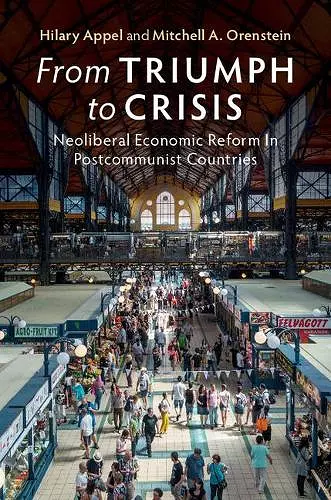From Triumph to Crisis
Neoliberal Economic Reform in Postcommunist Countries
Hilary Appel author Mitchell A Orenstein author
Format:Paperback
Publisher:Cambridge University Press
Published:10th May '18
Currently unavailable, and unfortunately no date known when it will be back
This paperback is available in another edition too:
- Hardback£80.99(9781108422291)

Explains the surprising endurance of neoliberal policymaking over two decades in post-Communist countries, from 1989–2008, and its decline after the financial crash.
This book explains how and why post-Communist countries persisted in pursuing a course of difficult neoliberal reforms from 1989–2008, despite expectations that the political, social and cultural legacies of communism would impede change. This revelatory new theory will interest students of political economy and Eastern European and Eurasian politics.The postcommunist countries were amongst the most fervent and committed adopters of neoliberal economic reforms. Not only did they manage to overcome the anticipated domestic opposition to 'shock therapy' and Washington Consensus reforms, but many fulfilled the membership requirements of the European Union and even adopted avant-garde neoliberal reforms like the flat tax and pension privatization. Neoliberalism in the postcommunist countries went farther and lasted longer than expected, but why? Unlike pre-existing theories based on domestic political-economic struggles, this book focuses on the imperatives of re-insertion into the international economy. Appel and Orenstein show how countries engaged in 'competitive signaling', enacting reforms in order to attract foreign investment. This signaling process explains the endurance and intensification of neoliberal reform in these countries for almost two decades, from 1989–2008, and its decline thereafter, when inflows of capital into the region suddenly dried up. This book will interest students of political economy and Eastern European and Eurasian politics.
'From Triumph to Crisis argues that after 1989, postcommunist states adopted increasingly radical neoliberal reforms as they competed with each other for much-needed foreign investment. While many scholars have emphasized the importance of international influences in post-communist transformations, this provocative and well-written book is the first to take on the transition paradigm's mistaken over-emphasis on domestic dynamics, explain exactly how and why it led us astray, and offer a comprehensive alternative explanation. It should be widely read by social scientists and policy makers interested in understanding how neoliberalism steadily and deeply reshaped the post-communist region after 1989.' Juliet Johnson, McGill University, Montreal
'The phrase 'more Catholic than the Pope' well describes the attraction that postcommunist elites had for neoliberal reforms in the period 1989–2009. Despite the massive social costs involved, the postcommunist countries embraced neoliberal reforms with zeal, and persisted with them through boom and bust. The easy explanation for this embrace is ideological and cultural. That after forty years of communism these states could not get to capitalism fast enough. Appel and Orenstein give us a better answer. Forty years of communism destroyed the capital stocks of these countries and they had to be rebuilt with FDI. To get that inflow they had to signal that they were indeed 'more catholic than the pope' when it came to neoliberal reforms. Its partisans like to think that neoliberalism drives capital forward. What Appel and Orenstein show us is that competition for capital drove neoliberalism forward. Rather than ideas driving policy, we see necessity driving the adoption of ideas.' Mark Blyth, Brown University, Rhode Island
'Countries in the postcommunist world that launched and sustained radical market reforms have achieved much better outcomes than states which followed alternative approaches. But it is not sufficient to explain the popularity of these reforms among many (but not all) postcommunist governments. This book provides an excellent overview of market reforms in the postcommunist countries and a critical analysis of the political economy explanations of these reforms. Against this background, the authors propose their own thought-stimulating theory based on 'competitive signalling'.' Leszek Balcerowicz, Warsaw School of Economics
'These two authors are excellent stewards through this retrospective of the postcommunist transition process and the relevant literature, guiding us through the policy laboratories of Eastern European countries since the fall of the Berlin Wall.' Julia Gray, Perspectives on Politics
ISBN: 9781108435055
Dimensions: 228mm x 150mm x 13mm
Weight: 370g
254 pages